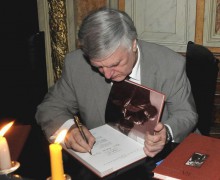Writer’s House in Kyiv held a poetry evening dedicated to two Latvian poets – Rainis (Janis Plieksans, 1865-1929) and Aspazija (Elza Rozenberga-Plieksane, 1868-1943). It was presided by Raul Chichalava, poet, translator, and the compiler of Tricolor Sun, a trilingual edition of the couple’s poetry in Latvian, Ukrainian, and Georgian.
The occasion of Latvian presidency in the EU, under which the event took place, imbued the evening with a political aspect. Dr. Argita Daudze, Ambassador of Latvia to Ukraine, expressed Latvian solidarity with Ukraine in light of the recent historical circumstances. The topic of Latvian-Ukrainian solidarity and historical allusions repeatedly came up in other people’s commentaries. Chichalava told about Rainis’ ambition to become Latvian president between the World Wars and his failure in this endeavor. “And the Latvians are happy of this outcome. Had he succeeded with this aspiration, Latvia would have lost a remarkable writer, but would not get a good politician.” Certainly, many of us see the analogy with Volodymyr Vynnychenko, whose struggle for power did bear fruits, but his success was not something that made many people happy.
Romantic, early Modernist works, and sometimes aphorisms of the Latvian poets were recited. By the way, they are called “the second generation of Latvian poetry,” and their work is indeed a significant part of Latvian heritage. Rainis and Aspazija were translated to Ukrainian quite a lot: from Mykola Bazhan and Hryhorii Kochur to Yurii Zavhorodnii and Chichalava himself (however, the last publication happened a long time ago, and Tricolor Sun is a rare book – thus Rainis and Aspazija are not widely recognized poets in Ukraine, as well as the Latvian poetry in general). Chichalava also recited one of the poems in his Georgian translation.
The otherwise felicitous occasion was marked by an embarrassment: the Writer’s House was out of electricity. The heating was also absent and it was quite cold in there. Because of this the audience, dressed in winter jackets and coats, sat in the flickering and uncertain candlelight. Dmytro Pavlychko joked on this incident that the people present should be given weapons to complete the picture. Indeed, one can say that the atmosphere was romantic and suitable for the poetry of the first half of the 20th century, but it is a shame to have an international literary event, featuring many acknowledged writers and translators, as well as the Ambassador and other foreign guests, held in dark and frigid conditions in the very center of the capital, clearly neither besieged nor starving. This fact also demonstrates the ambiguous status of the Writer’s Union and its uncertain prospects of long-awaited changes; the pitiful state of culture in general in Ukrainian society reflects poorly on the level of society itself. This level is not upheld to every standard that have been proclaimed since the times of Maidan.







